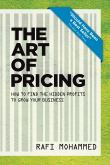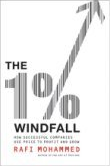Kudos, Lottery Ticket-Cashers, Sharing Value & Warren Buffett
My sincere thanks to Todd Sattersten - the well-respected business book aficionado/reviewer and former president of business book specialty retailer 800CEOREAD - for including The 1% Windfall in his Top 10 of 2010 list.
Now onto the blog…A recent Boston Globe article highlighted the tax-depleting activities of “ticket-cashers” in the Massachusetts lottery system. Ticket-cashers buy winning lottery tickets for 90 cents on the dollar from “real” winners and redeem them. Both parties benefit from this arrangement.
What makes this market work is that ticket-cashers are professional gamblers who can write off losses against their winnings. I am not suggesting that they would – but if need be, it is fairly easy to document large gambling losses. One summer of my youth, I worked at the IRS and a colleague cynically shared the details of an audit of a professional gambler. Questioning large reported losses, this savvy gambler brought in stacks of losing wager tickets with many sharing one unique oddity: shoe marks across the tickets. This ingenious gambler had simply picked up losing tickets at the local race track and claimed them as his own.
Auditors found that in 2007, one unusually “lucky” lottery player cashed in 1,492 tickets that were worth about $2.6 million. In 2007, the top ten ticket-cashers redeemed 5,938 tickets worth $9.3 million. While Massachusetts Lottery officials understand this practice is ongoing, they are obligated to pay whoever redeems a winning ticket.
What intrigued me most is how did the 10% “ticket-casher” service charge come about? Why 10%? It’s clear that “real” lottery winners could be saving a lot more than 10% by going this route: avoiding federal and state taxes as well as child support payments, for instance. On the flip-side, there are probably plenty of professional gamblers with little differentiation between them. I would have thought, short of an OPEC-like cartel, that the fee could have been bid down to, say, 5%.
This interesting service actually brings up a key question that managers who are implementing value-based pricing often ask me. Suppose your product saves customers a lot of money, how much of these savings do you have to giveaway to customers and how much can you enjoy as profit? My answer is: “However much it takes to get customers to purchase your product.”
Warren Buffett and his colleagues at Geico, for instance, have found success with the magic number of 15%. By eliminating agents and handling customer service via the Internet and phone, Geico has cut significant costs from its auto insurance product. Instead of giving away all of these cost-savings to consumers, Geico has centered its marketing message on “15 minutes could save you 15% or more.” 15% is resonating with customers as Geico is the fastest growing auto insurer in the United States.
As always, my sincere thanks for reading and best wishes for a great 2011!




